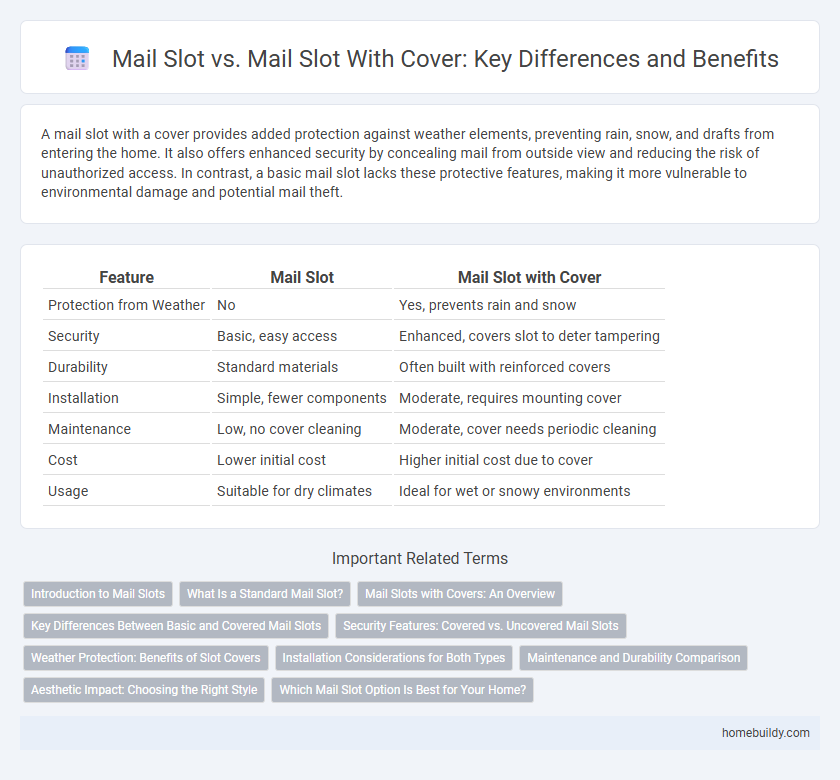A mail slot with a cover provides added protection against weather elements, preventing rain, snow, and drafts from entering the home. It also offers enhanced security by concealing mail from outside view and reducing the risk of unauthorized access. In contrast, a basic mail slot lacks these protective features, making it more vulnerable to environmental damage and potential mail theft.
Table of Comparison
| Feature | Mail Slot | Mail Slot with Cover |
|---|---|---|
| Protection from Weather | No | Yes, prevents rain and snow |
| Security | Basic, easy access | Enhanced, covers slot to deter tampering |
| Durability | Standard materials | Often built with reinforced covers |
| Installation | Simple, fewer components | Moderate, requires mounting cover |
| Maintenance | Low, no cover cleaning | Moderate, cover needs periodic cleaning |
| Cost | Lower initial cost | Higher initial cost due to cover |
| Usage | Suitable for dry climates | Ideal for wet or snowy environments |
Introduction to Mail Slots
Mail slots provide a convenient and secure way to receive mail directly through a door or wall, offering both privacy and weather protection. A mail slot with cover enhances this functionality by preventing drafts, rain, and debris from entering, while further safeguarding against theft. Choosing a covered mail slot increases durability and improves insulation, making it a preferred option for residential and commercial use.
What Is a Standard Mail Slot?
A standard mail slot is a narrow opening installed on a door or wall, designed to receive mail directly into a home or office without the need for a mailbox. Mail slots typically measure around 10 inches wide by 2 to 3 inches tall, allowing standard letters and small packages to pass through efficiently. Unlike mail slots with covers, standard mail slots do not have a protective flap, which may expose the interior to weather elements and reduce security.
Mail Slots with Covers: An Overview
Mail slots with covers provide enhanced security and weather protection compared to traditional open mail slots, preventing unauthorized access and minimizing mail damage from rain or wind. These covers often feature durable materials like stainless steel or reinforced plastic, which improve longevity and resistance to tampering. By incorporating a mail slot with a cover, homeowners and businesses can safeguard their correspondence while maintaining convenient mail retrieval.
Key Differences Between Basic and Covered Mail Slots
Basic mail slots offer direct access for mail delivery but lack protection against weather elements, increasing the risk of water damage and debris entering the slot. Covered mail slots feature a protective flap or lid that shields mail from rain, snow, and dirt while also enhancing security by preventing easy visibility and access. The key differences lie in the level of protection and durability, with covered mail slots providing superior defense against environmental damage and unauthorized retrieval.
Security Features: Covered vs. Uncovered Mail Slots
Mail slots with covers provide enhanced security by preventing unauthorized access and reducing the risk of mail theft through covered entry points that shield contents from prying eyes. Uncovered mail slots allow easier access but leave mail exposed, increasing vulnerability to tampering and environmental damage. Installing covered mail slots with secure locking mechanisms significantly improves protection against theft and weather elements.
Weather Protection: Benefits of Slot Covers
Mail slots with covers provide superior weather protection by preventing rain, snow, and debris from entering the slot, reducing damage to mail and interior surfaces. Slot covers often feature durable, weather-resistant materials that help maintain the integrity of mail during adverse weather conditions. Installing a cover enhances the lifespan of the mail slot and improves overall security by minimizing exposure to environmental elements.
Installation Considerations for Both Types
Installing a standard mail slot requires precise alignment within the door or wall to ensure smooth mail delivery and security, while a mail slot with a cover demands additional clearance for the flap mechanism and often includes weatherproofing elements to prevent water infiltration. Both types must be mounted at an optimal height for postal carrier access and interior clearance to allow mail to drop unobstructed into the designated receptacle. Proper sealing around either slot is critical to maintain energy efficiency and prevent drafts or pests from entering the building.
Maintenance and Durability Comparison
Mail slots without covers typically require more frequent cleaning and maintenance due to direct exposure to weather elements, dust, and debris, which can lead to faster wear and potential damage. Mail slots with covers provide an added layer of protection that enhances durability by preventing moisture intrusion and reducing the accumulation of dirt inside the slot. This protective feature significantly lowers maintenance needs and extends the lifespan of the mail slot, making it a more durable and cost-effective option.
Aesthetic Impact: Choosing the Right Style
Mail slots with covers provide a sleek, finished look that enhances curb appeal by concealing the mail opening and reducing visible wear. Plain mail slots may appear more utilitarian, potentially detracting from a home's architectural style. Selecting a mail slot with a cover allows for customized designs and finishes that complement exterior aesthetics while offering functional benefits.
Which Mail Slot Option Is Best for Your Home?
Choosing between a standard mail slot and a mail slot with cover depends on security and weather protection needs. A mail slot with cover offers enhanced protection against rain, wind, and tampering, reducing the risk of damaged mail and unauthorized access. For homes in areas with harsh weather or higher security concerns, a covered mail slot is the optimal choice to safeguard deliveries and maintain privacy.
mail slot vs mail slot with cover Infographic

 homebuildy.com
homebuildy.com